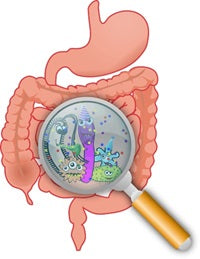Establishing a healthy gut microbiome may be the single most important thing that we can do to optimize health.
The gut microbiome represents the total population of microbes which reside in the intestine. The microbial makeup for each individual is as unique as an individual’s fingerprint. The Human Microbiome Project sponsored by the National Institute of Health was established to identify and characterize the microorganisms which are found in association with both healthy and diseased humans. They’re trying to tease out friend from foe, from amongst this diverse population of microorganisms that reside in our gut.
Individuals with Irritable Bowel Syndrome and leaky gut in many cases may have an imbalance of bad bacteria relative to good bacteria as an underlying cause of their problem. This imbalance is also referred to as dysbiosis. They might also have pathogenic or disease causing yeast or parasites in the gut.
There are up to 1,000 bacterial species in our gut. There are 10 times more bacteria than human cells in our body. The bacteria possess 100 times more genetic material than our human cells and it has been discovered up to 40 human genes were actually derived from bacteria.
We have known for a long time that the bacteria in our gut are important for proper digestion and some consider these bacteria “our forgotten organ” and they are probably more important than any of our other digestive organs. As an example, they help produce nutrients from our food such as vitamin K.
It is now known that the human microbiome can influence metabolic and immune system function – either promoting health or on the other hand contributing to a wide range of disability and disease.

The more bacterial diversity we have the better. Our microbiome is constantly evolving. It has been shown if you were born on a farm or even exposed to dogs early in life – you’re less likely to get allergies later in life. With this in mind it is hard to justify our obsession with getting rid of germs.
Derangement in the human microbiome has been associated with obesity, cancer, and mental health. Some feel that this may account for the surge in autism and ADHD. Our gut microbiome is influenced by the foods we eat and our environment. Overuse of antibiotics is probably a leading cause of an unhealthy gut microbiome. Even exercise has been shown to promote gut bacteria diversity and may be another factor explaining the beneficial effects of exercise.
Microbial colonization begins at birth and is influenced by the type of delivery and subsequent feeding practices. Babies who are born vaginally get a mouth full of probiotics from the mom as they pass through the birth canal. On the other hand, babies born by C-section are more likely to be colonized by skin bacteria such as Staphylococcus and Streptococcus which predisposes them to skin disorders such as eczema. We have known for a long time that babies born by vaginal delivery and subsequently breastfed tend to be healthier. It’s all about establishing a healthy gut microbiome from day one.
There has been a lot of recent, renewed interest in fecal transplantation whereby a healthy person’s microbiota or feces is instilled into a sick person’s gut and this procedure has been shown to treat a common life-threatening intestinal infection called Clostridium difficle which kills up to 14,000 Americans each year.
The body of knowledge regarding the gut microbiome is growing rapidly, although I think we are just scratching the surface.
